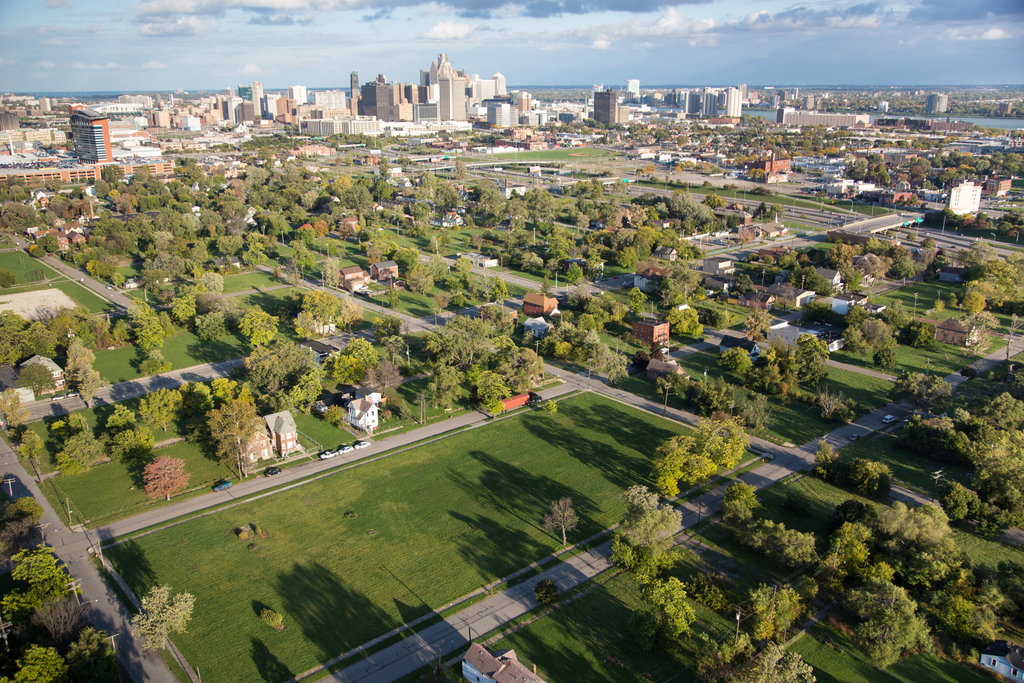How a Detroit Homestead Act Could Fix the Motor City’s Housing and Revenue Crises

” … each family shall have a plot of not more than (40) acres of tillable ground… in the possession of which land the military authorities will afford them protection, until such time as they can protect themselves.”
-Union General William T. Sherman’s Special Field Order No. 15, from which derives the famous phrase ‘40 acres and a mule’
My grandfather used to say the problem with Detroit is that it owns itself. He didn’t mean that Detroiters owned it, but rather that their government did: a 2011 study found that local, state and federal governments own over 50,000 properties in Detroit, a full 12% of the total. In the hardest-hit neighborhoods, that number is closer to 50%. If this year’s round of foreclosure notices succeeds in evicting 65,000 homeowners – 51% of Detroiters are property tax delinquent – that percentage will only skyrocket. And the cost of just maintaining city-owned land is driving the city further into debt: $25 per lot for lawn mowing, hundreds more to board up and secure abandoned properties, the public price tags go on and on…
The official response to this spiraling problem has been to initiate more and more tax auctions, in the hopes that people will buy city-owned properties and renovate them. If the news this week is any indication, that approach is not working. A plan to auction off 400 abandoned homes has placed new owners in only a third of them, primarily due to prospective buyers not finding sufficient financing. Detroit has over 650,000 residents, but only 578 new mortgages were approved last year. No one will lend to Detroit. The free market isn’t coming to save us.
There is another way.
Detroit has full power to distribute this vacant and blighted land, and it should utilize that power to put it in the hands of regular people ready to fix it up.
Why not create a simple application to allow individuals and families with the will and demonstrated ability to improve public land to take ownership of it? The city already does this for so-called side lots, where residents can purchase adjoined properties to their own for as little as $100. Expand this program to all city-owned lots, and broaden the qualifications to include any Detroit resident or future-resident whose committed to living on the land and working it. And reduce the fee to $0 while we’re at it. You can call it reparations, or land reform, or even homesteading if you’d like.
In the original Homestead Act of 1862, homesteaders had to “live on the designated land, build a home, make improvements, and farm it for a minimum of five years.” In the case of Detroit, homesteaders would clear out blight, renovate salvageable homes, grow urban farms and gardens, and rehabilitate abandoned industrial and commercial space with new small and medium-sized businesses.
I’m not the first to suggest this idea. Economist Jeffrey Dorfman floated a similar idea last year:
With the claimants paying the costs of clearing away the blight and improving the properties, the city would save over $1 billion. The blighted structures represent about 20 percent of all parcels in the city. If they are a proportional share of acreage, they would be about 18,000 acres. That means that if people claim the maximum amount Detroit would need about 2,000 people to claim property under their homestead act to solve their entire problem. With over 50,000 people employed in the construction sector in the Detroit metropolitan area and over 100,000 in the state of Michigan, it seems likely that Detroit could find enough takers to solve much of their problem.
I agree with much of Mr. Dorfman’s idea, perhaps only deviating in my opinion that low-income Detroit renters and un-housed or precariously housed people should be given first priority to homestead. An ambitious construction training and apprenticeship program could benefit many of the nearly 16,000 Detroit homeless residents today and help them build financial independence while simultaneously solving the pervasive problem of people-less homes.
Governor Rick Snyder last year proposed a variation on this theme, though his plan would be only for foreign immigrants and would not actually entitle them to free/low cost land, just expedited Green Cards. I don’t oppose the idea of making Detroit a safe haven for undocumented immigrants – with this new Republican administration we may really need one – but first preference should not go to those with “high-skills” in whatever new industry Gov. Snyder decides will save Detroit, but rather to those with a demonstrable interest in cleaning up and building/working on the land.
The Detroit Homestead Act of 2015 could be a precedent-setter for the entire struggling rust belt, where blight pervades and exacerbates deepening inequalities in society. We have an opportunity to make post-bankruptcy Detroit livable again for millions of diverse people, reinvigorate the economy and the local tax base. All it takes is some bold thinking and long-term vision. And it starts with the land.

